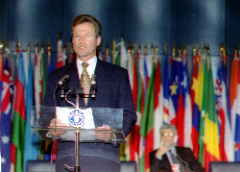


NEW ZEALAND - NOUVELLE-ZELANDE - NUEVA ZELANDIA | ||
The Honourable Lockwood Smith, Minister of Agriculture of New Zealand | ||

We come here together for this major Summit to give new impetus to the fight against hunger. If we are to make real progress towards our goal this Summit much achieve a coherent recommitment by governments to a balanced and practical approach to reinforcing global food security. In particular, our solutions must be sustainable. Emergency measures are essential in critical situations and I applaud the lead Canada has taken in this regard. But they will not rid the world of hunger. That requires more comprehensive solutions which fight the root causes of hunger on all fronts. Let us be under no illusions. Political stability, good governments and respect for all human rights and fundamental freedoms form an essential framework for success. Within that framework practical and enduring solutions will require that skill levels be raised to ensure the production and distribution, both internally and internationally, of safe and nutritionally adequate food in ways that are environmentally and economically sustainable. As poverty is reduced, and skill levels raised in the economy, people are better able to produce food or the goods and services that provide them with the means to purchase their requirements. Sustainability in all senses is vital. Because New Zealand's economy is based largely on food production, we have been forced to think long and hard about how best to ensure that our food producing industries are sustainable. We have recognized that for New Zealand agriculture to continue to provide the income our country needs we must consider all aspects of sustainability; environmental, social and economic. For many years New Zealand had in place, as many countries still do, a system which distorted farming through subsidies and price support. That damaged not just our farming sector but our environment and the economy as a whole. We have now removed those distortions, not just from agriculture, but throughout our economy. Transition is not easy, but New Zealand farmers welcome the open system now in place. Under it, the market and environmental and other laws set a sound framework for good management decision-making leading to more efficient and sustainable food production. The sea presents its own problems of sustainability. This critically important resource is in a state of crisis. It is clear to us that the false economics created by subsidisation of fishing leads to over-capitalization, excess capacity and overfishing, putting the whole global resource at risk. To ensure sustainability in fishing New Zealand has established a new system based on individual property rights within an overall sustainable catch. The catch size is derived from scientific data and fixed by the Government. The system is designed to ensure that our fishing industry is sustainable in both an economic and environmental sense. New Zealand also believes that free trade fosters food security. An open and well functioning international trading system is the most certain way to ensure adequate food supplies for all. The distortions to trade resulting from subsidization and protectionism have negative effects which undermine sustainability in the broadest sense. They restrict the ability of developing countries to export agricultural products in which they have comparative advantage and trade distortions threaten the security of their food supplies whether locally produced or imported. Free trade provides the benefits of comparative advantage and thus over time improves living standards for all. It fosters the ready availability of nutritionally sound food around the world. It is a key element in ensuring the secure supply of food and combatting hunger. The Rome Declaration and the Summit Plan of Action reflect the substantial role of trade in food security. Building on New Zealand's experience in agriculture, our development assistance programmes have always made a contribution to food security and poverty alleviation and will continue to focus on creating integrated and sustainable farming systems. Our programmes recognize the importance of women as food producers and the need to include them in all facets of the development process. We shall continue to emphasize the importance of local crop varieties, the needs of subsistence farmers and the importance of involving local farmers directly in research, training and project implementation. The Plan of Action that has been adopted here is a declaration of confidence that the problems of hunger can be overcome and that this Summit can point the way to solutions. Only if we all undertake to pursue these solutions with the utmost vigour will this Summit achieve its objectives. If we fall short we betray those in the world who do not have access at all times to the food they need for an active and healthy life; we betray the vulnerable who suffer most from hunger. Let us each ensure that we do not have that on our conscience. | ||

 |